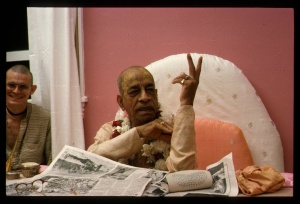SB 9.4.33-35: Difference between revisions
m (1 revision(s)) |
No edit summary |
||
| Line 1: | Line 1: | ||
{{info | {{info | ||
|speaker= | |speaker=Śukadeva Gosvāmī | ||
|listener=King | |listener=King Parīkṣit | ||
}} | }} | ||
[[Category:Srimad-Bhagavatam - Canto 09 Chapter 04]] | |||
[[Category:Bhagavatam Verses Spoken by Sukadeva Gosvami - Vanisource|090433]] | |||
<div style="float:left">'''[[Srimad-Bhagavatam]] - [[SB 9|Ninth Canto]] - [[SB 9.4: Ambarisa Maharaja Offended by Durvasa Muni|Chapter 4: Ambarīṣa Mahārāja Offended by Durvāsā Muni]]'''</div> | |||
<div style="float:right">[[File:Go-previous.png|link=SB 9.4.31-32]] '''[[SB 9.4.31-32]] - [[SB 9.4.36]]''' [[File:Go-next.png|link=SB 9.4.36]]</div> | |||
{{RandomImage}} | |||
==== TEXTS 33-35 ==== | ==== TEXTS 33-35 ==== | ||
<div | <div class="verse"> | ||
gavāṁ rukma-viṣāṇīnāṁ | :gavāṁ rukma-viṣāṇīnāṁ | ||
rūpyāṅghrīṇāṁ suvāsasām | :rūpyāṅghrīṇāṁ suvāsasām | ||
payaḥśīla-vayo-rūpa- | :payaḥśīla-vayo-rūpa- | ||
vatsopaskara-sampadām | :vatsopaskara-sampadām | ||
prāhiṇot sādhu-viprebhyo | |||
gṛheṣu nyarbudāni ṣaṭ | :prāhiṇot sādhu-viprebhyo | ||
bhojayitvā dvijān agre | :gṛheṣu nyarbudāni ṣaṭ | ||
svādv annaṁ guṇavattamam | :bhojayitvā dvijān agre | ||
labdha-kāmair anujñātaḥ | :svādv annaṁ guṇavattamam | ||
pāraṇāyopacakrame | |||
tasya tarhy atithiḥ sākṣād | :labdha-kāmair anujñātaḥ | ||
durvāsā bhagavān abhūt | :pāraṇāyopacakrame | ||
:tasya tarhy atithiḥ sākṣād | |||
:durvāsā bhagavān abhūt | |||
</div> | </div> | ||
| Line 25: | Line 32: | ||
==== SYNONYMS ==== | ==== SYNONYMS ==== | ||
<div | <div class="synonyms"> | ||
''gavām''—cows; ''rukma-viṣāṇīnām''—whose horns were covered with gold plate; ''rūpya-aṅghrīṇām''—whose hooves were covered with silver plate; ''su-vāsasām''—very nicely decorated with garments; ''payaḥ-śīla''—with full milk bags; ''vayaḥ''—young; ''rūpa''—beautiful; ''vatsa-upaskara-sampadām''—with nice calves; ''prāhiṇot''—gave in charity; ''sādhu-viprebhyaḥ''—unto the ''brāhmaṇas'' and saintly persons; ''gṛheṣu''—(who arrived) in his house; ''nyarbudāni''—ten crores (one hundred million); ''ṣaṭ''—six times; ''bhojayitvā''—feeding them; ''dvijān agre''—first the ''brāhmaṇas''; ''svādu annam''—very tasteful eatables; ''guṇavat-tamam''—highly delicious; ''labdha-kāmaiḥ''—by those ''brāhmaṇas'', being fully satisfied; ''anujñātaḥ''—by their permission; ''pāraṇāya''—for completing the Dvādaśī; ''upacakrame''—was just about to observe the final ceremony; ''tasya''—of him (Ambarīṣa); ''tarhi''—immediately; ''atithiḥ''—unwanted or uncalled-for guest; ''sākṣāt''—directly; ''durvāsāḥ''—the great mystic Durvāsā; ''bhagavān''—very powerful; ''abhūt''—appeared on the scene as a guest. | |||
</div> | </div> | ||
| Line 32: | Line 39: | ||
==== TRANSLATION ==== | ==== TRANSLATION ==== | ||
<div | <div class="translation"> | ||
Thereafter, Mahārāja Ambarīṣa satisfied all the guests who arrived at his house, especially the brāhmaṇas. He gave in charity sixty crores of cows whose horns were covered with gold plate and whose hooves were covered with silver plate. All the cows were well decorated with garments and had full milk bags. They were mild-natured, young and beautiful and were accompanied by their calves. After giving these cows, the King first sumptuously fed all the brāhmaṇas, and when they were fully satisfied, he was about to observe the end of Ekādaśī, with their permission, by breaking the fast. Exactly at that time, however, Durvāsā Muni, the great and powerful mystic, appeared on the scene as an uninvited guest. | Thereafter, Mahārāja Ambarīṣa satisfied all the guests who arrived at his house, especially the brāhmaṇas. He gave in charity sixty crores of cows whose horns were covered with gold plate and whose hooves were covered with silver plate. All the cows were well decorated with garments and had full milk bags. They were mild-natured, young and beautiful and were accompanied by their calves. After giving these cows, the King first sumptuously fed all the brāhmaṇas, and when they were fully satisfied, he was about to observe the end of Ekādaśī, with their permission, by breaking the fast. Exactly at that time, however, Durvāsā Muni, the great and powerful mystic, appeared on the scene as an uninvited guest. | ||
</div> | </div> | ||
__NOTOC__ | |||
<div style="float:right; clear:both;">[[File:Go-previous.png|link=SB 9.4.31-32]] '''[[SB 9.4.31-32]] - [[SB 9.4.36]]''' [[File:Go-next.png|link=SB 9.4.36]]</div> | |||
__NOTOC__ | |||
__NOEDITSECTION__ | |||
Revision as of 08:32, 15 May 2021

A.C. Bhaktivedanta Swami Prabhupada
TEXTS 33-35
- gavāṁ rukma-viṣāṇīnāṁ
- rūpyāṅghrīṇāṁ suvāsasām
- payaḥśīla-vayo-rūpa-
- vatsopaskara-sampadām
- prāhiṇot sādhu-viprebhyo
- gṛheṣu nyarbudāni ṣaṭ
- bhojayitvā dvijān agre
- svādv annaṁ guṇavattamam
- labdha-kāmair anujñātaḥ
- pāraṇāyopacakrame
- tasya tarhy atithiḥ sākṣād
- durvāsā bhagavān abhūt
SYNONYMS
gavām—cows; rukma-viṣāṇīnām—whose horns were covered with gold plate; rūpya-aṅghrīṇām—whose hooves were covered with silver plate; su-vāsasām—very nicely decorated with garments; payaḥ-śīla—with full milk bags; vayaḥ—young; rūpa—beautiful; vatsa-upaskara-sampadām—with nice calves; prāhiṇot—gave in charity; sādhu-viprebhyaḥ—unto the brāhmaṇas and saintly persons; gṛheṣu—(who arrived) in his house; nyarbudāni—ten crores (one hundred million); ṣaṭ—six times; bhojayitvā—feeding them; dvijān agre—first the brāhmaṇas; svādu annam—very tasteful eatables; guṇavat-tamam—highly delicious; labdha-kāmaiḥ—by those brāhmaṇas, being fully satisfied; anujñātaḥ—by their permission; pāraṇāya—for completing the Dvādaśī; upacakrame—was just about to observe the final ceremony; tasya—of him (Ambarīṣa); tarhi—immediately; atithiḥ—unwanted or uncalled-for guest; sākṣāt—directly; durvāsāḥ—the great mystic Durvāsā; bhagavān—very powerful; abhūt—appeared on the scene as a guest.
TRANSLATION
Thereafter, Mahārāja Ambarīṣa satisfied all the guests who arrived at his house, especially the brāhmaṇas. He gave in charity sixty crores of cows whose horns were covered with gold plate and whose hooves were covered with silver plate. All the cows were well decorated with garments and had full milk bags. They were mild-natured, young and beautiful and were accompanied by their calves. After giving these cows, the King first sumptuously fed all the brāhmaṇas, and when they were fully satisfied, he was about to observe the end of Ekādaśī, with their permission, by breaking the fast. Exactly at that time, however, Durvāsā Muni, the great and powerful mystic, appeared on the scene as an uninvited guest.